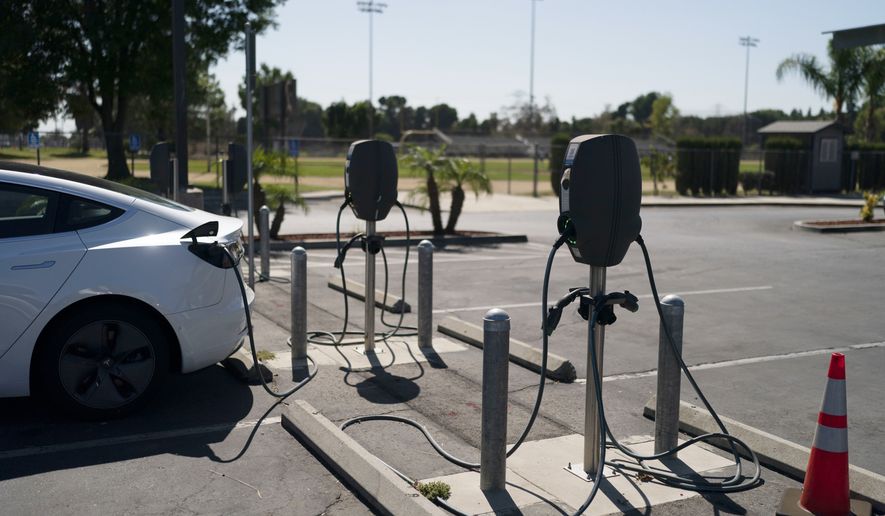Charging electric vehicles in Britain soon will be more expensive than filling up gasoline-powered cars thanks to soaring electricity costs — an economic switcheroo that could be a harbinger of shrinking financial benefits for Americans who go green.
British energy regulators told electricity consumers to expect to pay 80% more beginning Oct. 1. The national price cap on residential electricity will send the average bill from about $190 per month to an estimated $343 per month, or more than $4,000 per year.
The shocking price hike stems from the nation’s limited reserves and Russia’s cutoff of one of the region’s major sources of electricity generation: natural gas. British energy prices eclipsed those of many other Europeans because the nation lacks domestic energy storage and production of natural gas, nuclear and renewables, making it more reliant on imports.
Kenny Stein, policy director of the Institute for Energy Research, warned that the financial hardship in Europe from rising energy prices is an omen for Americans if the U.S. transitions from fossil fuels to renewables faster than the supply can handle.
“For the U.S., this actually gets to an underlying fallacy of a lot of people that are pushing electric vehicles: They assert electric vehicles are cheaper because they assume electricity prices are going to stay cheap,” Mr. Stein said. “You’re combining the increased demands on electricity. That means you’ve got to build a new generation.”
The U.S. is making a major pivot toward electric vehicles. President Biden’s climate spending law is pumping billions of dollars into the production of EVs and providing tax credits to people who buy them.
California last week announced a phaseout of the sale of new gasoline-powered vehicles beginning in 2026. The deadline to end sales of new gasoline-powered cars is 2035. Many other Democratic-run states are expected to follow California’s lead.
British electricity prices will nearly double from about 33 cents per kilowatt-hour to 60 cents per kilowatt-hour, making electric vehicles cost more before and after owners drive them off the lot. The average electricity cost in the U.S. is less than 11 cents per kilowatt-hour, according to the Energy Information Administration.
With British electricity prices climbing and gasoline at roughly $7.40 per gallon, the owner of a $40,000 electric Kia Niro would spend more than $100 more to travel 400 miles than the owner of a $26,000 gas-powered Kia Sportage, according to an analysis by the Royal Automobile Club, the British equivalent of the AAA.
A $71,000 Jaguar I-PACE would cost nearly $115 more to go 400 miles than its gas-powered equivalent, the $52,000 Jaguar F-PACE.
London-based Electrifying.com has a slightly rosier outlook. It estimates that the average electric vehicle user now saves 27% on fuel, less than 75% a year ago. With the higher electricity prices, an electric Volkswagen ID.3 crossover that travels 10,000 miles per year will save $34 per month on fuel compared with the gas-powered VW Golf of a similar size.
The price jump of electricity will make the hardest impact on drivers who use public charging stations and pay higher energy taxes. Those who travel long distances or do not have access to an at-home charger will bear more of the burden. Electricity prices at public charging stations are cruising to almost 81 cents per kilowatt-hour.
Mr. Stein said the U.S. is in a much better position than Britain to weather fluctuating electricity costs because of its more robust production of the oil and natural gas used for power generation.
The average electricity cost in California is one of the highest in the country at 18 cents per kilowatt-hour, according to EIA data from 2020, the most recent year available. Although California’s cost is almost 70% higher than the national average of 10.59 cents per kilowatt-hour, it is about one-third of the new British price.
Rising U.S. natural gas prices have increased electricity costs. In July, Americans’ electricity bills climbed to their highest levels since 2008 and were nearly 90% higher than the same time last year.
Natural gas is trading above $9 per million British thermal units. The price a year ago was about $3.50.
• Ramsey Touchberry can be reached at rtouchberry@washingtontimes.com.




Please read our comment policy before commenting.